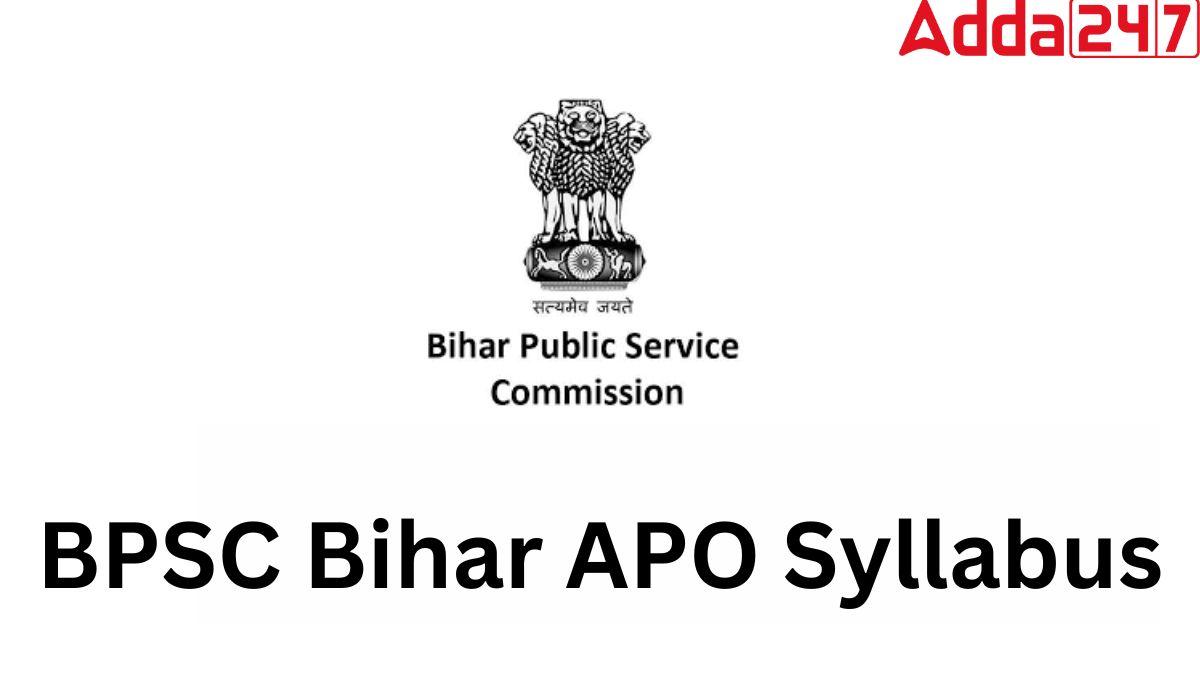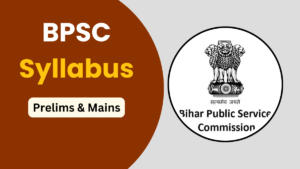Table of Contents
BPSC Bihar APO Syllabus 2024: The Bihar Public Service Commission (BPSC) is set to conduct a recruitment drive for the position of Assistant Prosecution Officer (APO) in 2024. The BPSC APO recruitment process includes three stages: the Preliminary Exam, the Main Exam, and a Final Interview. To advance through these stages and secure the position, it is essential to have a clear understanding of the BPSC APO syllabus. This comprehensive guide to the BPSC APO Syllabus for both the Preliminary and Main Examinations will help you structure your study plan effectively.
BPSC Bihar APO Syllabus
The syllabus outlined below will assist you in effectively preparing for the BPSC APO examination. Create your study plan by covering each topic as per the BPSC APO Exam Pattern and practice with sample question papers. ADDA 247 offers a free test series that can significantly enhance your preparation and help you achieve a higher score. Utilize these resources to refine your study strategy and boost your exam performance. Given the high level of competition, it’s crucial to start your preparation early and thoroughly. Do check all the other details for BPSC APO through the link given below:
BPSC APO Exam Pattern
The Bihar Public Service Commission (BPSC) Assistant Prosecution Officer (APO) exam consists of two main stages: the Preliminary Examination and the Main Examination.
Prelims Exam: This initial stage is a screening test to shortlist candidates for the Main Exam. It includes two papers: General Studies and Law. The Preliminary Exam consists of multiple-choice questions and includes negative markings for incorrect answers. The General Studies paper covers a broad range of topics, while the Law paper focuses specifically on legal knowledge.
| S.No | Subject | No. of Questions | Marks | Duration |
|---|---|---|---|---|
| Paper 1 | General Studies | 100 | 100 | 2 Hours |
| Paper 2 | Law | 100 | 150 | 2 Hours |
| Total | 200 | 250 | 4 Hours |
Main Exam (Descriptive Type)
This stage is more detailed and assesses candidates’ in-depth knowledge through descriptive-type questions. The Main Exam is divided into several papers, covering General Studies, Hindi and English Languages, and various legal subjects including the Indian Penal Code, Indian Evidence Act, Code of Criminal Procedure, and other relevant laws. Each paper is designed to evaluate candidates’ proficiency in both general and specific areas related to the Assistant Prosecution Officer role.
| Paper | Subject | Marks | Duration |
|---|---|---|---|
| Paper 1 | General Studies | 100 | 3 Hours |
| Paper 2 | Hindi Language | 100 | 3 Hours |
| Paper 3 | English Language | 100 | 3 Hours |
| Paper 4 | Indian Penal Code, 1860 | 150 | 3 Hours |
| Paper 5 | Indian Evidence Act, 1872 | 150 | 3 Hours |
| Paper 6 | Code of Criminal Procedure, 1973 | 150 | 3 Hours |
| Paper 7 | Other Law | 150 | 3 Hours |
BPSC Assistant Prosecution Officer (APO) Syllabus
The Selection Process for Bihar PSC Assistant Prosecution Officer consists of two different stages: Prelims and Mains. The detailed syllabus for both stages Prelims and Mains is given below:
BPSC APO Prelims Syllabus 2024
The BPSC Assistant Prosecution Officer (APO) Preliminary Examination consists of two different papers, each covering different areas of general and law knowledge.
General Studies
- Geography
- General Science on everyday
- Life of Indian History and Culture
- General Knowledge and Current Affairs
- Indian Political System
Law
- Code of Criminal Procedure, 1973
- Indian Penal Code, 1860
- Indian Evidence Act, 1872
- Questions related to fundamental knowledge of the Indian Constitution.
BPSC APO Mains Syllabus 2024
The BPSC Assistant Prosecution Officer (APO) Main Examination consists of several papers, each covering different areas of knowledge.
1. General Studies
- Current events of international importance
- National and General Science
- Geography of India & Bihar
- General Knowledge including Current Affairs
- History of India and salient features of the history of Bihar
- Indian Culture
- Major geographical divisions of Bihar and important rivers
- India’s state system and economic system
- Indian Political System
- India’s national movement and Bihar’s contribution to it
- Major changes in Bihar’s economy after independence
2. Hindi Language
- Grammar
- Essay Writing
- Syntax
3. English Language
- Essay Writing
- Summary/Precis Writing
- Letter Writing
4. Indian Penal Code, 1860
5. Indian Evidence Act, 1872
6. Code of Criminal Procedure, 1973
7. Other Laws
- The Arms Act, 1959
- Dowry Prohibition Act, 1961
- The Scheduled Castes and Scheduled Tribes (Prevention of Atrocities) Act, 1989
- Prevention of Corruption Act, 1988
- Explosive Substances Act, 1908
- The Poxo Act, 2012



 APSC Syllabus 2025, Download Prelims And...
APSC Syllabus 2025, Download Prelims And...
 Punjab PCS Syllabus 2025, New Prelims an...
Punjab PCS Syllabus 2025, New Prelims an...
 BPSC Syllabus 2025 and Exam Pattern For ...
BPSC Syllabus 2025 and Exam Pattern For ...




